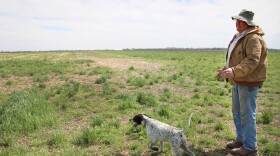
Eva Tesfaye
Eva Tesfaye is a 2020 Kroc Fellow. She started in October 2020 and will spend the year rotating through different parts of NPR.
She joined NPR after graduating from Columbia University with a B.A. in English and a minor in French and Francophone studies, where her studies focused on African literature and the history of French colonization. She also spent a year in Paris taking literature courses at the Sorbonne. During her time at Columbia, she reported for her campus radio station, WKCR.
She grew up moving around Africa and has lived in Uganda, Rwanda, Sudan, South Africa, and Kenya.
-
A new study from the U.S. Department of Agriculture found that the Special Supplemental Nutrition Program for Women, Infants and Children was underutilized. In 2021, it served only about half the number of people that qualified.
-
The U.S. Department of Agriculture published its new standard for organic livestock production. Industry groups say that this will help producers compete and promote trust in organic products for consumers.
-
Thousands of competitors come to the American Royal Livestock Show in Kansas City, Missouri, each year to show their best livestock. The competition includes children as young as 7 years old, who take part in a long tradition of raising and showing their animals.
-
Much of the research on regenerative farming practices, such as no-till or cover crops, has looked at the benefits to the environment and the soil. Now a new study finds these farming practices also have economic benefits for farmers.
-
A fifth of reported heat-related deaths between 2017 and 2022 were agricultural workers, according to OSHA data. Academics, occupational health specialists and advocacy groups are calling attention to the under-reported impact of climate change on this group from heatwaves.
-
A slowdown in the agricultural industry is "going to put a strain on farmers." But analysts say the rural economy in the Midwest and Great Plains is still doing well.
-
Tribes in the Midwest and Great Plains are embracing and sharing traditional agricultural knowledge with both Native and nonnative farmers to improve the soil and water for everyone.
-
The United Nations has declared 2023 the International Year of Millets — a type of small grain mostly grown in parts of Asia and Africa. The highly resilient and cost-friendly grains could make them the next crop for U.S. farmers in the midst of climate change.
-
Tar spot, a fungal disease, first appeared in the U.S. in 2015 with reports in Indiana and Illinois. Since then, it has been spreading across the Midwest.
-
Blue-green algae appears in lakes all over the Midwest during the summers and can make both people and animals ill. Few states have routine testing programs to check for the toxic algae, but some local and volunteer groups are stepping in to fill that gap.









